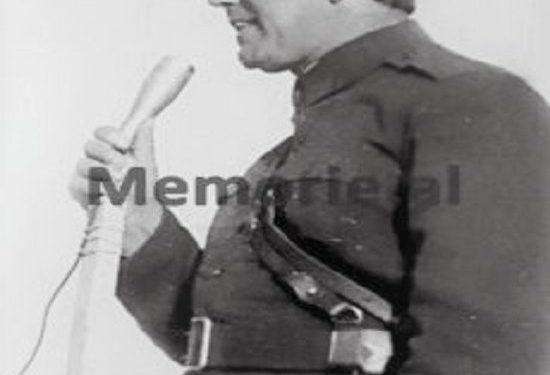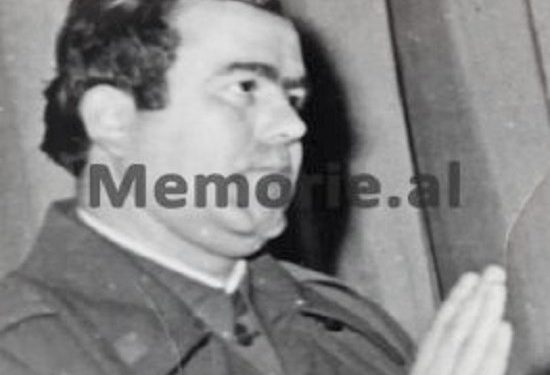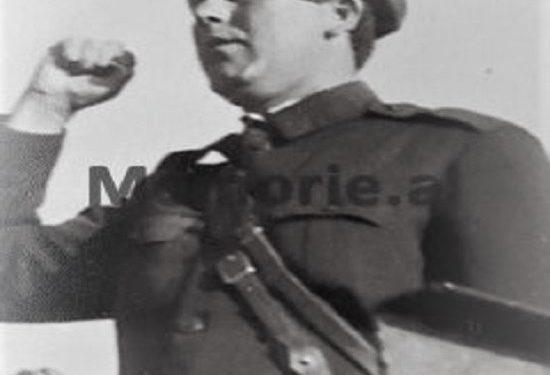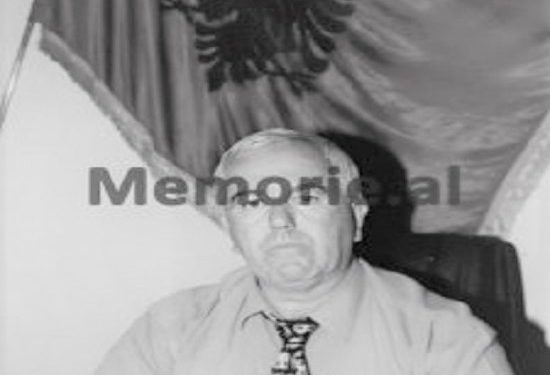Dashnor Kaloçi
Memorie.al publishes the unknown story of the retired colonel, Dalip Zhaboli, considered one of the most trained officers of the Albanian Army after those of the War generation who had graduated from the academies of the Soviet Union, who in 1976 when he served in the duty of the commander of the Military Corps of Puka, after a conversation he had with Ramiz Alia regarding the role of commissars in the Army, he was arrested on various charges and sentenced to 15 years in political prison. What is said in the archival document where the former Deputy Prosecutor General of the Republic, Sotir Samara, informs the Deputy Minister of Defense on the “hostile activity” of Zhabol and “his group” consisting of: Ilirjan Hitaj, Diogjen Nako, Sali Çako of Lefter Qirici, and how he comments on it in his exclusive interview that we are publishing in this article.
“The convict Dalip Zhaboli has carried out hostile activity in various forms, with the aim of distorting the right political, ideological, military, etc. views of the effective of the 5900 Bishop Department where he was a brigade commander. It was proved that many times he openly opposed the important decisions of the IV, V, VI and VII plenums of the Central Committee of the Party, agitating and propagandizing against the leading role of the Party in the army; reducing the importance of the duties of the Party secretary and political commissar and deifying the role and duties of the commander both in time of war and in time of peace ”. This is stated, among other things, in an information of the Deputy General Prosecutor of the Republic, Sotir Samara, sent to the Deputy Minister of Defense, Llambi Gegprifti, which is dated November 17, 1976 and which refers to the sentence that was imposed on him at that time “Enemy of the people”, the commander of the Puka Corps, Dalip Zhabolit. What is further stated in that information of the Deputy General Prosecutor about the senior military who commanded the Corps of Northern Albania and what accusations are made there against him? What was the conversation that Zhaboli had with Ramiz Alia in the reserved room of the House of Officers of the Burrel Corps in 1975 and why was that conversation often mentioned during the investigation process after his arrest? Regarding this and others about this issue, we know the archival document and the testimony of Mr. Zhaboli, who tells exclusively for Memorie.al, in this article that we are publishing below.
Jabol’s brilliant military career
Dalip Zhaboli was born on March 5, 1942 in Martanesh i Matit and grew up in an Orphanage in Durrës. In 1957 he graduated from the United School of Officers “Enver Hoxha” (in the field of all weapons), and was appointed to a ward in Tirana and then in Peshkopi. From 1965 to ’68, he studied at the Military Academy “Mehmet Shehu” in Tirana, completing it with excellent results and in 1970 (at the age of 28), Dalip Zhaboli was appointed head of the Operations Branch. and at the same time Deputy Chief of Staff in the Burrel Corps. In 1974, he was appointed commander of the Puka Corps, otherwise known as the “Northern Corps” (which was supposed to be the first barrier to an eventual attack by the former Yugoslavia at the time), which would to mark the peak of Jabol’s military career, as after three years in that very important task, in January ’76 he was arrested for political motives on charges of “sabotaging the political line in the army”, being sentenced to 15 years in prison. From that sentence given by the Military College of the High Court in Tirana, Zhaboli suffered only 11 and a half years in prison, benefiting from the reduction of the rest of the sentence to work and the various amnesties that were granted at that time. After his release from prison at the end of 1987, he worked as a potter in Kavaja and after the beginning of the democratic process, in ’91, he returned to the Ministry of Defense as a division and brigade commander, ending his military career in 1998 as General Director of the Prison Administration of Albania, with the rank of Colonel.
This is more or less the short biography of the retired colonel, Dalip Zhaboli, who until his arrest in 1976, was considered by all as one of the most trained soldiers of the Albanian Army (after some generals who had graduated from the academies of the Union Soviet), described as such by the then Prime Minister and Minister of Defense, Mehmet Shehu. Zhabol’s beating and punishment marked the end of the “Iron Broom in the Army” which had started immediately after the beating and punishment of the so-called “Coup group of Beqir Balluku”. After that, Zhaboli served a large part of his sentence in the Qafe-Bari Prison Camp, where in 1984 he took part in what is now known as the “Qafe-Bari Revolt”, where the communist regime retaliated. shot two of its protagonists, Tom Ndoja and Sokol Sokoli, while Sander Sokoli (a graduate of the Aviation Weapon in the Soviet Union, the nephew of Lieutenant General Sadik Bekteshi), died in torture before being released and sent to Puka Branch of Internal Affairs. According to some archival documents related to that event that was also published by Memorie.al some time ago, in the report of the Camp Command and the Internal Branch of Puka, sent to the Ministry of Interior regarding that event, among other things it is known that: The convicts Dalip Zhaboli and Hajredin Fratari, incited the other convicts in the outbreak of the revolt… “. And as a result, Zaboli and Fratari were two of the many convicts who were inhumanly tortured by the police and military forces that suppressed that revolt. Shortly afterwards, Zhaboli was taken to Zejmen prison where he was tortured again and in the presence of the Director of State Security, Zylyftar Ramizi, who put forward a list of names of the protagonists of the revolt, asking him to sign it, in seeking immediate release from prison. Which Zhaboli did not accept and the tortures against him continued. While these things are already known from the documentary “Bloody Revolt of Qafë-Bar” made by the Albanian Public Radio and Television with the support of the OSCE Office in Albania, where in addition to Zhabol, his accomplices also witnessed the protagonism of to that revolt, such as: Bajram Vuthi, Hajredin Fratari, Haxhi Baxhinovski, Lekë Frroku, Bedri Blloshmi, Agim Hoxha, Kostandin Gjordeni, Pjetër Luli, etc., in this article we are publishing the document of the Deputy General Prosecutor of the Republic, Sotir Samara, on the accusations against Zhabol and his (Dalip) interview, exclusive to Memorie.al.
Deputy General Prosecutor: “Here is the hostile activity of the former commander Dalip Zhaboli”
In the letter of the Deputy General Prosecutor of the Republic, Sotir Samara, addressed to the Deputy Minister of Defense, Llambi Gegëprifti, which was extracted from the state archives (FA Archive, File 222, Year 1976), entitled: “Information on some problems that arose during the trial of the former commander of the Corps in Puka Dalip Zhaboli and the civilian Skënder Shatku “, it is written:” From 15 to 17 October 1976 in Tirana took place the trial of the defendants: Dalip Zhaboli and Skënder Shatku and was sentenced first, to 15 years in prison for agitation and propaganda against popular power, dissemination of information constituting a state secret and abuse of official position; second, with 25 years of imprisonment for treason against the Homeland through espionage and agitation and propaganda against popular power. The hostile activity had started in 1970 and continued in increasing proportions until before the arrest, Dalip on 24.1.1976 and Skënderi on 28.9.1975. The convict Dalip Zhaboli has carried out hostile activity in various forms with the aim of distorting the right political, ideological, military, etc. views. of the 5900 Bishop ward where he was brigade commander. It was proved that many times he was openly opposed to the important decisions of the IV, V, VI and VII plenums of the Central Committee of the Party by agitating and propagandizing against the leading role of the Party in the army; reducing the importance of the duties of the Party secretary and political commissar and deifying the role and duties of the commander both in time of war and in time of peace, against the theses of the Popular Martial Arts for volunteer and offensive forces, against measures to eliminate differences between cadres and soldiers etc. All these have served the enemy Skënder Shatku, who has used them for his interests and goals. He had carried out the tasks assigned to him by the Yugoslav UDB by agitating and propagating against the recent decisions of the Party mentioned above, making comparisons at will and propagating over the alleged economic and military superiority of Yugoslavia, in order to corrupt the officers of the above-mentioned ward where he was a reservist and to involve them in hostile activities, etc. These, although they had nothing to do with the enemy, had entered into hostile activity due to infection by the bourgeois-revisionist ideology, which then led them to deep moral degeneration, and finally to betrayal of the Homeland. From the development of the trial some problems emerged, among others we think that these are: 1) The cadres did not work hard enough to educate them about the teachings of the Party and the works of Comrade Enver and did not show the necessary care for their life and activity, both during working hours and in their free time, especially for the officers of young people coming from school benches, unmarried etc. These weaknesses of the work of the party and the ward command had to some extent weakened the struggle against the bourgeois and revisionist ideology. Thus, some of the young cadres, especially those who lived in the officers’ hotel, watched the television and radio shows of foreign stations, to imitate foreign fashion in dress and hair, had begun to lead a life of knitting by drinking, gambling etc. 2) The transfer of cadres to wards and sub-wards deployed in remote locations has not always been accompanied by a careful and differentiated ideological work, as an important measure taken by the Party and the Command as for those who have had shortcomings at work , as well as in the case where they were originally appointed, in order for them to be mobilized in the accomplishment of tasks and, those who had erred, to correct the shortcomings and weaknesses. This has adversely affected some cadres like p. sh. Diogjen Nako, Lefter Qirici, etc., and to create misconceptions about the reasons and purpose of their transfer to ward 5900, who had considered their transfer only as a punishment and to stay there permanently without any perspective to move to another location. 3) The ward command did not properly assess the class struggle. Reservists with bad political composition were allowed to be placed in the staff and to perform responsible tasks such as of the top calculators of the citizen plan as appointed by Skënder Shatku. Also, people who did not have the necessary conditions and political guarantees were hired and hired, such as a person with bad political composition, contrary to the rules, by order of the former commander, who was hired as a storekeeper in a subdivision. of the Dalip Zhaboli Brigade; enemy Sabri Llame (who was recently convicted of treason as a Yugoslav intelligence agent) was hired and allowed to sleep and eat with soldiers at the brigade’s combat command post for two months in a row. A thorough analysis of the problems that emerged shows that the main reasons that have influenced the development of hostile activity in that military unit, lie in the pronounced weaknesses of ideological work for the training of cadres, underdevelopment of class warfare and low revolutionary vigilance. for detecting and unmasking hostile activity. In particular, in these directions, the poor work and lack of vigilance of the former secretary of the Party Committee and ward commissioner Qebir Hysi, who had not performed his duty properly, has affected. In many cases he had been present in the hostile conversations that the enemy Dalip Zhaboli had about the role of commander, commissioner of volunteer and offensive forces, etc. and not only had he not taken a stand to unmask and inform the Party of his hostile activity, but in some cases he had adopted his hostile views as e.g. Ilirjan Hitaj, Diogjen Nako, Sali Çako and Lefter Qirici, who were recently convicted of agitation and propaganda against popular power. For various legal problems it should have been better worked by the prosecution bodies. In the future, more work will be done to popularize the law and enforce the rule of law in that military unit. “We intended to inform them of these problems that arose from the trial, as they may be valid to further strengthen the measures taken by the Party.”
Mr. Zhaboli, what is the truth of this document available to Memorie.al, where the Deputy General Prosecutor of the Republic, informs the Deputy Minister of Defense Llambi Gegëprifti about the problems that arose during your trial as former commander of the Puka Corps in the year 1976?
The truth about my sentence is not as simple as it is written in that information. Anyone who reads it can easily conclude that a person cannot be sentenced to 15 years in prison for the crimes that occur there.
Before you tell us what were the real reasons for your sentence, can you describe the chronological course of how your sentence came about?
During the period that I was the commander of the 18th brigade in the city of Peshkopi, until 1974, some of my subordinates, young officers, such as Ilirjan Hitaj, Dhiogjen Nako, Sali Çako and Lefter Qirici were placed under strict surveillance. State Security bodies, with a tendency to convict them of political wrongdoing. This time coincided with the orientation given by Enver Hoxha for the “iron broom in the army” after the sentencing of Beqir Balluku’s “group”.
Why exactly those officers you mentioned, were targeted by the Security?
They were young boys who had just finished school, reading books, watching foreign station television programs, following fashion, ironizing the excesses of Party leaders, and also talking to each other about their grievances. In addition, they expressed dissatisfaction with the sentence of political imprisonment of a fellow officer in the city of Shkodra, named Rustem Tabaku. For all this they were targeted by the State Security, which pursued them everywhere and provoking them in various ways. One of those provocations was sending Ilirjan Hitaj ostensibly on duty to Shkodra, to see who he would meet and what he would talk about. At the time when the Security was preparing their arrest, I called Ilirjan Hitaj and indirectly ordered him not to fall prey to the provocations of the Security. But my order had no effect, as the Security realized its purpose and arrested them. After their arrest, the trap began to narrow for me as well, blaming me for “why I had supported those officers and not hit them as the Party taught us”, which led to my arrest in January 1976. So, in short, this was the pretext or the obvious side that was found for my sentence, but in fact the reasons were different.
Can you tell us more specifically what were the real reasons for your sentence?
Prior to my arrest, sometime in late 1975, when I was serving as commander of the Puka Corps, I participated in the Burrel Corps Party Asset, as it was there that I had made Party life. My discussion in that active, where the Secretary of the Central Committee of the ALP Ramiz Alia was delegated, was interrupted several times by applause, although in no case did I mention by name Beqir Balluku, Petrit Dumen, Hito Çako or any other. To be honest, in the discussion I held there, I did not go beyond the time frames, but I never mentioned their names, as neither Beqiri, Petrit, nor Hitoja had told us not to train, or any another charge against them. After the meeting, Ramiz Alia called me to the reserved room, where Muharrem Muça and Nuredin Dushani, the commander and commissioner of the Burrel Corps, were also present. After giving me many compliments and asking me about the many contradictions that the commissars had at that time with the commanders in the army and I gave my answer that it was not general, but sporadic, Ramiz told me: ‘Now the Party has decided to add more the role of secretary of the Party committee in the army. Tell me, man, what do you think about this?
How did you respond?
I told him what I really thought, without gloves, expressing myself verbatim: ‘This will diminish the role of the commissar, who will remain a mere propagandist’. After my answer, Ramiz laughed softly and did not speak at all. But this conversation I had with Ramiz Alia alone was often mentioned to me during the investigation when I was arrested a year later.
How specifically?
They mentioned to me all the words I had said to Ramiz, of course without revealing his name, and they told me that with such thoughts I had sabotaged the political line of the Party in the army. This came to me in court, where the main witness, H. Isufi, (secretary of the Party Committee of the Bishopric Brigade, as the others were garrisoned) said, among other things: “Dalip Zhaboli has opposed the Party line in the army, appointing incompetent cadres in the Party line, and those capable in that of command.
Was this accusation true?
To be honest, there were cases when we mocked the commissioners or secretaries of the Party, as they were generally the most incompetent people in the army./Memorie.al














